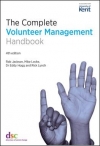Here are some suggestions that may reduce, but not eliminate, problems of involving staff as volunteers:
- Before accepting an employee as a volunteer, engage upper management in a discussion of the issue. If the organisation decides to proceed, develop a policy that outlines the circumstances under which such volunteering is acceptable.
- Ensure that any decision to volunteer by paid staff is entirely voluntary and without coercion or suggestion from management. This means that you should avoid any organised programme or project created by the organisation to specifically involve staff as volunteers in which the type of work is directly connected to the normal business activity of the organisation. It may also be prudent to avoid any organised internal recruitment campaign, which might be viewed as pressure from management to participate. The most suitable recruitment process, if any, would be spontaneous decisions by staff who are volunteering to tell their co-workers about what a good time they are having.
- Probe into the employee’s motivations for wanting to volunteer. If, as in the case study, the employee wants to re-engage with their past position which was more grass-roots, swapping a job role for a day or volunteering in another organisation may fulfil that person’s desire better and avoid potential problems.
- Compare the employee’s paid position description with their proposed volunteer assignment to ensure that they are distinct in type of work, location and time frame. All of these factors should be as different as possible. As the volunteering continues, periodically conduct an assessment to ensure that these distinctions remain in place. It’s absolute amazing how often unofficial job redesign can take place, all with the best of intentions.
- Exercise great care in making sure that being involved in volunteering will not have a negative impact on the staff member’s professional work. Before allowing the staff member to submit a volunteer application, require that they consult with their work supervisor and seek approval for the volunteer work. You may also want to discuss the situation with the supervisor yourself.
- Check with the person who will be supervising the staff member in their volunteer capacity to make sure that they are comfortable with this arrangement.
- The staff member should follow all the normal enrolment procedures of the organisation. This includes completing an application, being interviewed, going through orientation and training, and all other steps of volunteer involvement. If background checks are normally conducted on volunteer applicants, they should also be conducted for the staff member, unless they have already been carried out by the organisation’s personnel department.
- While it may seem silly to ask a staff person to participate in an orientation session about an organisation where they may have worked for a number of years, this step is important for two reasons. First, it will allow the member of staff to be introduced to some aspects of the organisation’s operations with which they are not familiar, such as the procedures of the volunteer programme. And second, it is important to remind the staff member that, while volunteering, they are subject to all the rules and procedures of the volunteer programme.
This last point is quite important. You will need to monitor the ability of the member of staff to adapt to their new role, and to maintain that role while volunteering. This means that they must be able to keep to the status and limits of their volunteer role while interacting with staff who are assigned as their supervisors, even though in their ‘work’ identity they may have greater authority than those members of staff. They must maintain their volunteer identity while working with other volunteers. Any attempt to ‘pull rank’ or display a sense of
greater knowledge or importance could be very detrimental to other volunteers.
It is also important to keep good written records on staff volunteers. An up-todate position description should be maintained and time sheets of volunteer hours (recording the actual hours worked, not just the total amount) should be kept, even if you do not keep them for other volunteers. Both of these documents could become invaluable if a dispute about employment status ever arises.
The purpose of this preliminary work, however, is to ensure that the volunteer programme does not become involved in disputes between management and staff which are not really its concern and which will only harm the volunteer programme. To avoid this you may want to consider a requirement that an employee’s volunteer position may be temporarily suspended if it conflicts with the performance of normal work duties.

